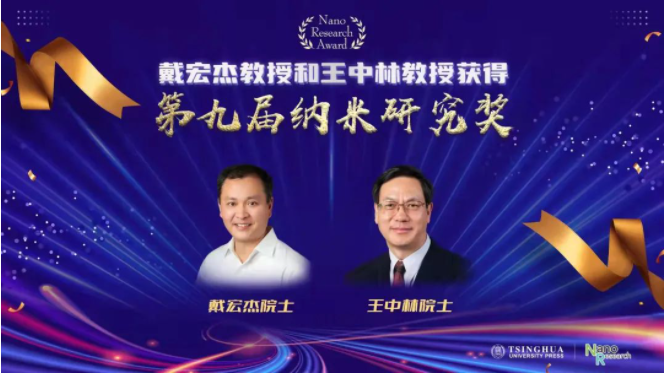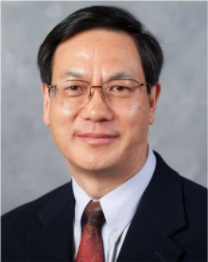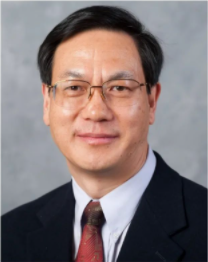戴宏杰教授和王中林教授获得第九届纳米研究奖

为表彰在纳米研究领域做出重大贡献、进而推动纳米学科发展的杰出科学家,《纳米研究(英文版)》(Nano Research)编委会、清华大学出版社以及施普林格出版社于2013年共同设立了国际性的纳米研究奖。此奖项每年评选一次,奖金为1万美元。候选人来自世界各个国家和地区,由《纳米研究(英文版)》编委会成员进行提名,评奖委员会决定最终人选。前八届获奖者分别是:哈佛大学 Charles M. Lieber教授 (2014)、加州大学伯克利分校 Paul Alivisatos教授 (2015)、加州大学伯克利分校杨培东教授 (2016)、中国科学技术大学谢毅教授 (2017)、中国科学院理化技术研究所江雷教授(2018)以及美国西北大学Chad A. Mirkin教授(2018)、中国科学院大连化学物理研究所包信和教授(2019)以及美国加州大学伯克利分校Omar M. Yaghi教授(2019)、复旦大学赵东元教授(2020)以及美国西北大学John A. Rogers教授(2020)、北京大学刘忠范教授(2021)以及荷兰代尔夫特工业大学Cees Dekker教授(2021)。
第九届纳米研究奖授予两位国际纳米科技领军人物:
2022年第九届纳米研究奖获奖人介绍 戴宏杰院士 戴宏杰,物理化学家,美国科学与艺术学院院士、美国科学院院士、中国科学院外籍院士,美国斯坦福大学化学系杰克逊-伍德化学教授。戴宏杰教授是国际公认的碳基纳米科学、可再生能源材料和纳米医学领域的领导者。他的开创性工作促进了准一维碳纳米材料的化学和物理基础研究,开辟了纳米碳材料从纳米管传感器/场效应晶体管到用于铝离子电池的石墨/石墨烯泡沫阴极、纳米医学的药物输送和光热疗法、以及用于体内成像生物系统的近红外-II (NIR-II)/短波红外(SWIR)探针等创造性应用。具体来说,戴宏杰教授对碳基纳米科学的贡献包括在表面图案化碳纳米管生长成有序碳纳米管阵列方面的开创性工作;首次合成石墨烯纳米带;基于单纳米管的纳米电子传感器;基于纳米管的弹道场效应晶体管;用于可再生能源的纳米碳材料;发明以石墨和石墨烯泡沫为正极的可充电铝离子电池;以及最近发明的无需脱盐将海水直接电解生产H2和O2的技术。戴宏杰教授也是纳米医学的先驱和领导者。他开创了用于生物系统的碳纳米管和石墨烯材料,包括药物输送和光热疗法。戴教授同时还开创了NIR-II/SWIR 荧光成像技术。戴宏杰教授对纳米科学和纳米医学的贡献获得了包括 APS、ACS、MRS和NIH 在内的四个主要专业学会以及组织的奖项。 王中林院士 王中林,材料科学家,中国科学院外籍院士、欧洲科学院院士、加拿大工程院国际院士,中国科学院北京纳米能源所所长,美国佐治亚理工学院教授。王中林教授主要从事材料科学和纳米科学研究。他在纳米材料可控生长、表征和应用等多方面取得了多项具有国际重大影响力的原创性研究成果。王中林教授的研究团队发现并开发了用于自供电系统和大规模蓝色能源的纳米发电机,这是一种前所未有的从环境和生物系统中收集能量的技术,可应用于个人电子产品、物联网 、生物医学设备、环境监测和机器人技术。王中林教授的创新成果还为人们从日常生活的无污染来源中获取大规模能源提供了一种革命性的方法。通过此研究成果人们有可能从海浪中获取大量能量,并解决未来世界的能源需求。王中林团队建立了基于压电电子学与压电光电子学效应的第三代半导体新的研究领域,并发现了六个新物理效应:压电电子学效应、压电光电子学效应、压电光子学效应、摩擦伏特效应、热释光电子效应和交流光伏效应。王中林教授在整个职业生涯中都是开拓新领域的先驱,他已成为纳米领域全球领军人物之一。 Ninth Nano Research Award goes to Hongjie Dai and Zhong Lin Wang Tsinghua University Press and Springer Nature honor two of the world’s leading experts in nanoscience and nanotechnology Two outstanding scientists have been awarded the annual Nano Research Award which is sponsored by Tsinghua University Press (TUP) and Springer Nature. Hongjie Dai is the Professor at Stanford University. Zhong Lin Wang is the Professor at Georgia Institute of Technology. Both winners have been invited to give keynote speeches at the Sino-US Forum on Nanoscale Science and Technology. Professor Hongjie Dai Professor Hongjie Dai won the Nano Research Award for his pioneering contributions to carbon based nanoscience and nanomedicine. Dai is the Jackson-Wood Professor of Chemistry at Stanford University. He is internationally recognized as a leader in carbon-based nanoscience, renewable energy materials and nanomedicine. His pioneering work has facilitated basic research in chemistry and physics of quasi-1D carbon nano-materials, and opened up creative applications of nano-carbon materials from nanotubes sensors/field effect transistors, to graphite/graphene foam cathodes for aluminum ion battery, drug delivery and photothermal therapy for nanomedicine, and near-infrared-II (NIR-II)/short-wave infrared (SWIR) probes for imaging biological systems in vivo. Specifically, Dai's contributions to carbon-based nanoscience include pioneering work on surface patterned carbon nanotube growth into ordered carbon nanotube arrays; the first synthesis of graphene nanoribbons; single-nanotube based nanoelectronic-sensors; nanotube based ballistic field-effect transistors; nano-carbon materials for renewable energy; invention of a rechargeable Al ion battery using graphite and graphene foam as the positive electrode; and recently, direct electrolysis of seawater to produce H2 and O2 without the need of desalination. Dai is also a pioneer and leader in nanomedicine. He pioneered carbon nanotube and graphene materials for biological systems including drug delivery and photothermal therapy. Lastly Dai pioneered NIR-II/SWIR fluorescence imaging. Dai’s contribution to nanoscience and nanomedicine has led to awards from four major professional societies/organizations including the APS, ACS, MRS, and NIH. Professor Zhong Lin Wang Professor Zhong Lin Wang was selected for the award in recognition of his discovery and development of nanogenerators for selfpowered systems and large-scale blue energy, an unprecedented technology for harvesting energy from the environment and biological systems, for applications in personal electronics, internet of things, biomedical devices, environmental monitoring and robotics. Prof. Wang’s innovations also provide a revolutionary approach for obtaining large-scale energy from daily life non-polluting sources with potential to harvest huge amounts of energy from ocean waves, aimed at solving the future energy needs of the world. His discovery and breakthroughs in developing nanogenerators have established the principle and technological road map for using mechanical energy for powering mobile sensors. He also coined the fields of piezotronics and piezo-phototronics for the third generation semiconductors, and discovered a few new physics effects. The Nano Research Award, established by the journal Nano Research together with TUP and Springer in 2013, is awarded for outstanding contributions to nano research by an individual scientist. The winner is selected by the Award Committee (the Editors-in-Chief, Associate Editors, representatives from TUP and Springer Nature) after receiving nominations from the members of the Nano Research Editorial Board. The first twelve recipients of the honor were Prof. Charles M. Lieber of Harvard University, Prof. Paul Alivisatos and Prof. Peidong Yang, both of the University of California Berkeley, Prof. Yi Xie of University of Science and Technology of China, Prof. Lei Jiang of Chinese Academy of Sciences, Prof. Chad Mirkin of Northwestern University, Prof. Xinhe Bao of Chinese Academy of Sciences, Prof. Omar M. Yaghi of the University of California Berkeley, Prof. Dongyuan Zhao of Fudan University, Prof. John A. Rogers of Northwestern University, Prof. Zhongfan Liu of Peking University, Prof. Cees Dekker of Delft University of Technology. 赵东元教授和John A. Rogers教授获得第七届纳米研究奖 包信和教授和Omar M. Yaghi教授获得第六届纳米研究奖




如果篇首注明了授权来源,任何转载需获得来源方的许可!如果篇首未特别注明出处,本文版权属于 X-MOL ( x-mol.com ), 未经许可,谢绝转载!



















































 京公网安备 11010802027423号
京公网安备 11010802027423号